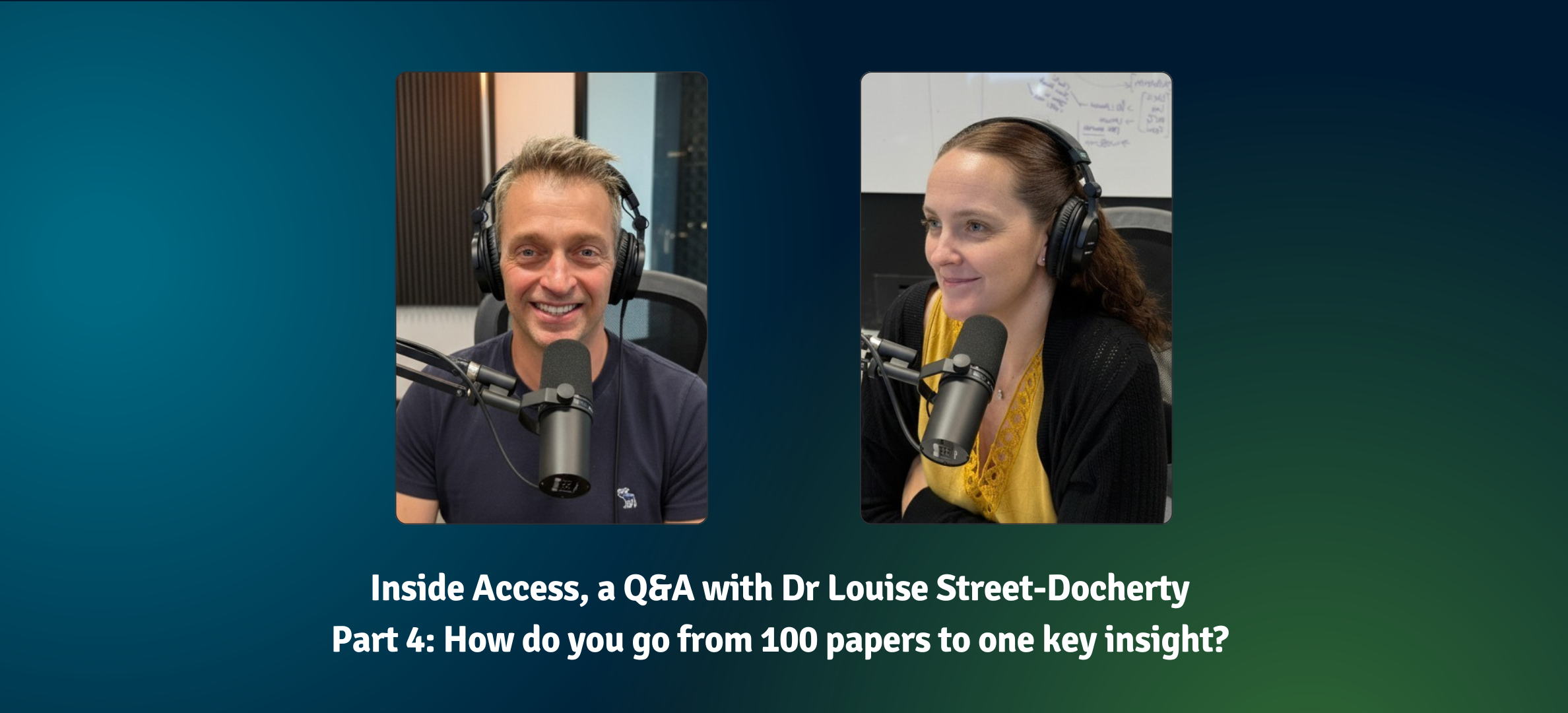
I’ve always believed that the real value in evidence isn’t volume, it’s clarity. We don’t get paid to read. We get paid to decide. And that means knowing how to spot what matters and bring it to the surface.
At Knowledgeable, our job is to give consultants and strategists the tools to make better decisions, faster. But tools alone aren’t enough. What sets great consulting teams apart is how they think. That’s why I asked Louise, our VP of Market Access, to share her perspective on one of the most critical questions in market access: how to turn raw literature into something that actually moves strategy forward.
How do you assess whether a finding is meaningful or just noise?
Louise Street-Docherty
I always start by looking at whether the evidence speaks directly to the strategic question we’re trying to answer. Not just in a loose way, but in the right indication, patient group, comparator, and endpoint.
A well-written result that doesn’t match the payer or clinical context still counts as noise. On the other hand, a small observational study that aligns tightly with the question can be very useful, even if it lacks statistical power. I’m always looking for that intersection between relevance and rigor.
If a finding holds up when triangulated across other data sources, guideline trends, or payer behavior, it tends to earn a place in the final story.
What role does clinical relevance play when synthesizing evidence?
Louise Street-Docherty
Clinical relevance is the filter that makes sure we’re building arguments that actually land. Just because a study is large or statistically significant doesn’t mean it’s helpful to the people making access decisions.
I’ve seen teams try to include studies because they’re recent or highly cited, only to find that they muddy the value narrative. The best evidence is always the kind that makes the real-world case stronger. That means prioritizing endpoints that matter to clinicians, comparators that make sense in local treatment guidelines, and populations that reflect who will actually receive the treatment.
How do you avoid over-relying on AI summarization or drowning in manual review?
Louise Street-Docherty
There’s a temptation to pick one extreme or the other, to either trust AI blindly or ignore it altogether. The truth is, neither works. AI is excellent at giving you a head start. It can sort, structure, and flag things you might miss. But the judgment call still needs to come from a human.
I use AI-generated summaries as my first pass. If something looks important, I check it against the abstract. If it’s critical, I read the full text. It’s about creating space for faster review, not skipping review altogether.
That’s why Knowledgeable is so helpful. The traceability means I can always go back to the source. I don’t need to guess how the summary was formed or what data it’s based on. That trust in the process changes everything.
What are the red flags in interpretation that junior consultants often miss?
Louise Street-Docherty
The biggest one is assuming the abstract is always right. Many junior consultants quote abstracts verbatim without checking for context, limitations, or even contradictory findings in the full text.
Another common mistake is overvaluing statistical significance. A p-value under 0.05 doesn’t always mean it’s important. What matters is whether the result answers the strategic question in a way that will resonate with payers or regulators.
I also encourage teams to look for what’s not in the data. Missing subgroups, inconsistent comparators, or endpoints that aren’t aligned with HTA needs should all raise questions.
How is Knowledgeable designed to blend grounded AI with human quality control so insights are trustworthy and traceable?
Louise Street-Docherty
Knowledgeable has been designed to support the way we actually work. That starts with making search, screening, and synthesis easier and faster, while never removing the consultant from the process.
AI highlights relevant content, suggests key takeaways, and extracts structured fields. But every element is traceable. You can always see the PMID it came from, the exact sentence it pulled, and the context around it. That’s essential when you’re presenting to a client or building a value narrative.
It also learns from how teams work. As consultants review, flag, and refine, the system improves. That means junior team members can benefit from senior thinking without having to second-guess what’s important. And that consistency across projects makes delivery smoother, faster, and more reliable.
Summary
There’s no shortage of information in this industry. What’s scarce is time, clarity, and confidence. We built Knowledgeable to support better thinking, not to replace it. It’s designed to give every consultant the tools to move faster, go deeper, and make smarter decisions backed by evidence they can trust.
Because whether you’re in front of a client, a HTA, or your internal team, it’s not about how much data you’ve gathered. It’s about how clearly you can explain what matters, and why. That’s what earns trust. And that’s what wins access.

